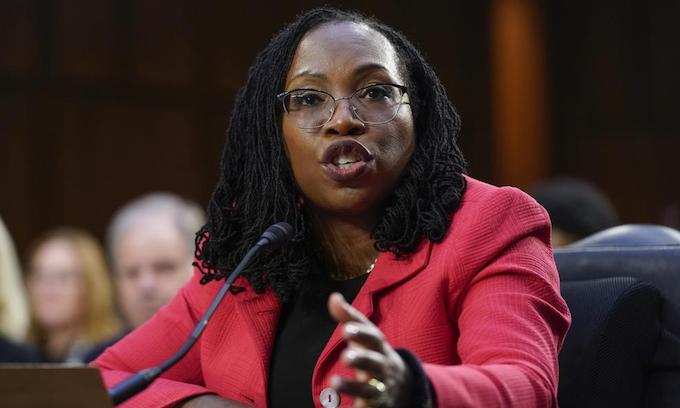Judge Ketanji Brown Jackson reflected Tuesday how within “one generation” her family has gone from experiencing segregation in Miami’s public schools to her potential confirmation as the first Floridian on the U.S. Supreme Court.
Jackson’s reflection on her Miami roots and the city’s civil rights history stemmed from a question about a speech she delivered in 2020 at the University of Chicago School of Law in which she quoted Dr. Martin Luther King, Jr.
“My parents when they were growing up in Miami, Florida, attended and had to attend racially segregated schools because by law when they were young white children and Black children were not allowed to go to school together,” Jackson told Sen. Chuck Grassley, R-Iowa, the top Republican on the Senate Judiciary Committee who had posed a question about whether she still agreed with King’s dream that people would be judged “by the content of their character” rather than their race and that she inherited a world that had been transformed by the civil rights movement.
Live updates: Senate hearing on Ketanji Brown Jackson’s nomination to Supreme Court
“My reality when I was born in 1970 and went to school in Miami, Florida, was completely different. I went to a diverse public junior high school, high school, elementary school,” Jackson, 51, continued.
“And the fact that we had come that far was to me a testament to the hope and the promise of this country, the greatness of America, that in one generation – one generation – we could go from racially segregated schools in Florida to have me sitting here as the first Floridian to ever be nominated to the Supreme Court of the United States.”
Grassley, 88, the oldest member of the Senate, said he was glad that the country had the opportunity to hear Jackson’s reflection on the experience.
Supreme Court prospect Brown Jackson was a ‘star in the making’ at Miami’s Palmetto High
Jackson has repeatedly reflected on her Miami upbringing during the confirmation process, speaking Monday about her father’s studies at the University of Miami School of Law and her formative time on the debate team at Miami Palmetto High School.
In addition to highlighting her Florida ties, the exchange with Grassley also represented one of the most significant reflections on race so far in the historic confirmation process. Jackson would be the first Black woman to ever serve on the court and just the third Black justice.
Jackson is likely to field more difficult questions about race as the second days of hearings continue. Sen. Marsha Blackburn, R-Tennessee, accused Jackson the previous day of supporting critical race theory, an academic concept about the role of race in shaping public policy that has become a frequent target of Republican lawmakers in recent years.
©2022 Miami Herald. Visit miamiherald.com. Distributed by Tribune Content Agency, LLC.
—-
This content is published through a licensing agreement with Acquire Media using its NewsEdge technology.



















Do not make this about race—because it isn’t. But from what I’m hearing, she isn’t dazzling anybody with brilliance in her answers to questions. As a Liberal nominee, she has too many a***s to kiss and she can’t afford to miss one.
“Do not make this about race—because it isn’t.”?? HUH??
Biden said “only a black female would be his nomination to the SCOTUS”
This is not only racist, it is discriminating against the male gender.
And violates the Civil Rights Act of 1964. Congress passed Public Law 88-352 (78 Stat. 241). The Civil Rights Act of 1964 prohibits discrimination on the basis of race, color, religion, sex or national origin. Provisions of this civil rights act forbade discrimination on the basis of sex, as well as, race in hiring, promoting, and firing.
Never mind who is the most qualified…. in accordance with F… Joe Biden It has to be a Black Female.
To clarify—it isn’t about White supremacy/Black oppression. Not in the sense of segregation as referenced in the article.
DEMS ONLY EVER think of things, in terms of race (or gender)..
Jackson is a SEGREGATIONEST Just like Beijing Joey was in the Early to Mid 70′ s With Robert Bird was a One time Grand Wizard of the KKK
If something happens to Justice Clarence Thomas or he retires Sleepy Joe will replace him with a non white judge. You can bet on it!
What’s the bet, the next option will be a TRANNIE!!
Admiral Rachel Levine is already filling a slot.
There has been no systemic racism for a long time. Example: High schools-No. Colleges-No. Government-No. Military-No. Private sector jobs-No. There are millions of successful minorities who are a testament to this great country and the progress made in the last 160 years after the civil war. Just like Judge Jackson.
THE ONLY systemic racism, IS AFFIRMATIVE action!!!
since when have we made affirmitive action a part of becoming a judge?
THAT has been the dems way for years..
Considering that she can’t even define what a woman is, she most certainly won’t be accused of what the Urban Jungle Commandos refer to as, “Acting White”.
SEN. BLACKBURN: “Can you provide a definition of the word ‘woman’?”
JACKSON: “No, I can’t”
BLACKBURN: “You can’t?”
JACKSON: “I’m not a biologist”
https://twitter.com/pnjaban/status/1506548632471830529?ref_src=twsrc^tfw|twcamp^tweetembed|twterm^1506639518534811651|twgr^|twcon^s2_&ref_url=https://thenewamerican.com/biden-scotus-nominee-doesnt-know-what-a-woman-is-lawyer-how-can-she-settle-discrimination-cases/
THAT alone should ban her from the bench. ONE DOES NOT NEED a biology degree, to define what a woman is!
Oxford English Dictionary changes definition of ‘woman’ after complaints that it was ‘sexist’
Changes come following petition which has gained more than 34,000 signatures and claims current definition is ‘sexist’ and discriminates against women.
OH NO, one cannot be a woman or a man, a female or a male, that is sexist.
One must be labeled by whatever they identify with.
I identify with being a turtle. Does this make me a biological turtle??
Or is this just the insanity of the deranged Democrat’s mind??
If A Dog Acts like A Dog And humans Recognize A Dog As A Dog No one Should Be Surprised If the Animal Is A Dog, And we Shouldn’t Be Surprised If A Democrat Reacts Like A democrat, And thinks Like A Democrat, Your Dealing With A Democrat. Be Weary of the democrats for They’re Not Rational Human Beings, Be Ware.!
With what biden said about who his nominee would be only a black female should be enough to say this is discrimination and against current laws. By the way, where are those who cry about a human being being referred to a “female” when no such gender so why aren’t they hollering at biden about this?
To conservatives, Jackson’s story (like 0bama’s story) is proof that “institutional racism” isn’t a thing. However, to Leftists, this presentation of her story translates as:
“Never mind that I’ve already advanced to being a federal appeals judge and am being considered for the highest court in the land; my qualification that my parents experienced segregation makes me deserving of reparations, and this seat on the Supreme Court might almost make up for it.”
WE could literally hand them everything in the world, and they would STILL SAY ‘its not enough’..
The Social, Communist democrats of America have every reason to be proud of their Country and that they are Americans And that the elite members of the democrat party Aren’t proud And natural y Gratefull to be living Here Shows only that they ‘re Ungratefull and Should Leave this Country ” And don’t Let The Door Hit…. ” Them In the Butt On Their Way Out. “
Pity we can’t TOSS them out.. Permanently!